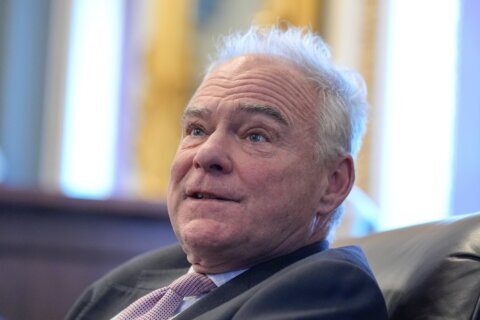Friday marks the Democrats’ first 100 days in control of the House of Representatives and the first 100 days of the dynamic freshman class that has captured national attention, tested leadership, commandeered the conversation and, at times, the Democratic legislative agenda.
The group of more than 60 new Democratic members — diverse, young, with strength in their record-setting numbers — have not been without controversy over the last three months in office, which has threatened at times to overshadow the work of the broader Democratic House caucus.
To mark the first 100 days on their “own terms,” nearly all of the freshmen contributed to a video to highlight what work they have accomplished in the first 100 days, led by freshman Democratic Rep. Lauren Underwood of Illinois.
“I conducted oversight of big banks, credit reporting agencies and Trump officials who cheated consumers,” says freshman Rep. Katie Porter, who has created many viral moments of her questioning during committee hearings, in the video.
Rep. Lucy McBath of Georgia, whose son Vernon Jordan was killed by gun violence, says H.R. 8 is her biggest accomplishment, adding it would affect “federal background checks for all gun sales and HR. 1112, closing the Charleston loophole.”
The video has short vignettes from all but one freshman — some are serious, noting policy proposals they’ve started making headway on.
Rep. Alexandria Ocasio-Cortez of New York touts the “90 co-sponsors” of her Green New Deal proposal. Rep. Ayanna Pressley of Massachusetts mentions the amendment she’s offered to lower the voting age to 16 years old. Rep. Ilhan Omar of Minnesota cites that she introduced and passed in the House the PAUL Act to strengthen the enforcement of foreign lobbying and to crack down on lobbyists who represent human rights abusers.
Others focus on the basics like building a “diverse staff” in the first 100 days, holding town halls or answering constituents’ letters as one of their accomplishments.
“I hope that people get a chance to know some people that that they might not have heard from before. We have a lot of superstars in our class,” Underwood told CNN about organizing the video. “Putting out a bold statement that says we’re here, we’re effective, we’re impactful and look at what we’ve done in just a short amount of time.”
Making news right out the gate
Indeed, many of the freshmen have made big impressions on the caucus, winning high-profile committee assignments and introducing key legislation for the Democratic agenda. Some, like Porter, have created viral moments by breaking the mold of typical questioning on hearings.
Their boldness has also created moments of controversy in a short amount of time.
On day one — the first night of the new Congress — freshman Rep. Rashida Tlaib of Michigan declared that she and her fellow lawmakers were going to “impeach the motherf**ker,” referring to President Donald Trump.
It was exactly the kind of rhetoric that Democratic leaders were worried about as they assumed the new majority. While it fired up the progressive base, it fed into a narrative that House Speaker Nancy Pelosi had long been trying to manage: that Democrats were bloodthirsty for Trump’s ouster and would undermine their own credibility if they moved too fast.
Tlaib’s comment quickly dominated the headlines, and Democrats arrived to the Capitol the next morning facing questions from reporters about her remarks. Two months later, as Tlaib unapologetically prepared to introduce an impeachment resolution, Pelosi forcefully reiterated her view that Democrats should not pursue impeachment unless there was significant evidence. “He’s just not worth it,” she added.
Pelosi’s comments threw a massive bucket of cold water on Capitol Hill, and — in a sign of the California Democrat’s powerful influence over her caucus — most members soon fell in line with downplaying impeachment. Only one other Democrat at the time joined Tlaib to support the resolution that she ultimately introduced in a rollout that had little fanfare.
But the drama over Tlaib’s comment paled in comparison to controversial tweets made by Omar. Critics, including many Democrats, argued the Minnesota freshman invoked anti-Semitic tropes and stereotypes in her comments criticizing US support for Israel.
Within a month, the House found itself voting on two resolutions condemning anti-Semitism — both of which were seen as rebukes against Omar. While she apologized for some of her comments, she didn’t apologize for everything and the debate exposed an emotional division among Democrats about US support for Israel.
Republicans seized on the fracture, and with the President’s help, started painting Democrats as an anti-Jewish party — another distraction that Democrats lamented as they sought to promote their own legislative agenda.
And Omar, who continues tweeting provocative comments — including just this week, calling Stephen Miller a “white nationalist” — has not shied away from taking on her critics head on, even those within her party.
“It’s been interesting to see such a powerful conference of people be so fearful of a freshman member of Congress,” Omar told CNN in March responding to criticism from members of her own party at the American Israel Public Affairs Committee conference in Washington, DC. “I hope that they figure out a way to not allow me to have a permanent residency in their heads.”
Omar drew criticism again this week over a comment that many viewed as minimizing the tragic events of 9/11. Refusing to back down, Omar went on the “Late Show” with Stephen Colbert to fend off attacks over her patriotism. “I am as American as everyone else is,” she said.
The Twitter question
In the same way that Republican lawmakers get irked by the President’s tweets, some Democrats have begun expressing similar frustration with their own colleagues, many of those freshmen who came into office with powerful social media followings.
As the Omar controversies unfolded, multiple members called for colleagues to ease up on the tweets.
“What we need to do is not be out there Twittering,” Rep. Debbie Dingell of Michigan told reporters last month. “We need to talk to each other.”
But Twitter is the same platform that has launched some of these freshmen into unprecedented fame. Many of them came into Congress using social media in nontraditional ways, from showing behind-the-scenes moments of their new journey to calling people out directly on Twitter.
Ocasio-Cortez has built the largest following on Twitter, now with close to 4 million followers, surpassing even Pelosi.
AOC, as she is known, has become a media sensation that has soaked up a significant amount of coverage of the freshmen class.
She regularly takes to her Twitter account to respond to news of the day, to take on Republican attacks directly, engage with journalists and call out what she sees as sexism on Capitol Hill. She also uses Instagram to show everyday life moments as a new congresswoman, featuring her at times cooking or assembling furniture in her apartment.
Democratic leaders have largely sought to harness her Twitter use rather than dampen it. She, along with Democratic Rep. Jim Himes, were invited to give a Twitter training in January to other members.
Still, Ocasio-Cortez’s celebrity status marks a highly unusual trajectory for a freshman member and bucks the strategy that many take of laying low at the beginning of their service.
Omar, in an appearance on the Stephen Colbert this week, said she also does not agree with those who tell her to “go slow” in Congress.
“Women have been told to go slow and not be seen and not be heard for many years,” she said of herself, Tlaib and Ocasio-Cortez. “We are not there to be quiet. We are not there to be invisible.”
Balancing a large class
Democratic leaders largely describe the attention on freshmen as a positive thing for the caucus, even as they try to corral and balance the power of a few within the broader context of the whole Democratic caucus.
“I think they are … a force to reckon with and we’re trying to reckon with them,” House Whip James Clyburn told CNN last month.
“Somebody else’s progress or success in the public arena is a plus for all of us,” Pelosi said at an event last month, when asked if it bothers her at all that younger members are in the spotlight. “It isn’t a zero sum game that if you have this, then that subtracts from something else. Again, I thrive on the diversity.”
Still, some feel frustrated with the media coverage, arguing only a few members of the freshman class are getting all the attention.
“If you read the papers or watch television, and you ask who are the new members of Congress, you come up with three names,” Hoyer told reporters last month. “There are 59 other extraordinarily competent, capable people. I mean it’s an extraordinary class. I think it deserves the attention of all of you.”
“I think the coverage does not project what is the reality,” he added.
Leaders are eager to showcase their majority-making freshmen and the backgrounds they bring. Hoyer and Pelosi happily appear at their press conferences to support their initiatives. Hoyer, for example, joined Underwood last week as she helped announce a new caucus on black maternal health.
Rep. Colin Allred, who won a previously red district in Texas, has been a big name on efforts by Democrats to preserve the Affordable Care Act.
Leaders are also arguing their caucus is unified despite the ups and downs from the past 100 days. It’s a message they’ve especially tried to convey to reporters at the Democratic issues conference in Virginia this week.
“We have such a unified caucus,” Pelosi told the press, criticizing their coverage. “You’re on the wrong track. But you can waste your time on that while we go forward with what we are going to do for the American people.”







